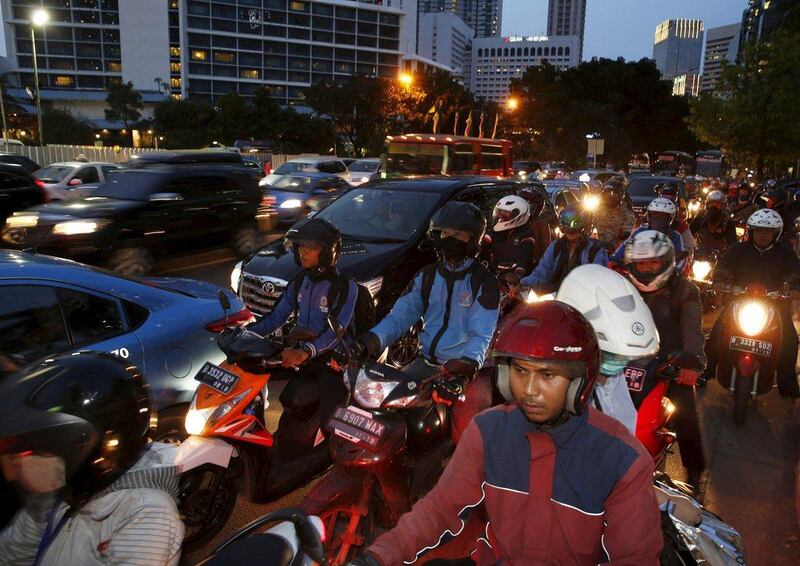JAKARTA // Millions of Jakarta commuters will have to struggle through the world’s most congested traffic for almost another decade, authorities believe, and they may have to wait even longer if US$4 billion worth of new railway projects do not work out as planned.
Jakarta’s gridlocked streets are the biggest headache for the Indonesian capital’s 10 million residents and a major hindrance to economic growth, with workers stranded for hours in buses, cars and motorcycles each day.
Jakarta ranked top among 78 cities for traffic stops and starts in a study published this year by motor oil firm Castrol, with the average driver having to stop 33,240 times a year — more than twice the number in New York.
New York drivers also travel twice as fast as those in Jakarta, whose average speed is a mere 8.3 kph. Abu Dhabi, the UAE capital, was one of the best cities polled in the study.
Making matters worse, at least a thousand new cars and motorbikes are added to Jakarta’s roads each day, government figures show.
“Congestion in Jakarta is already at an alarming level. In the not-too-distant future, the city will be paralysed by traffic,” said Budi Edi Praitno, a Jakarta commuter who traded his motorcycle for a bicycle to trim a few minutes from his 30km commute, which still takes more than an hour.
There are hopes that a mass rapid transit (MRT) system, under construction and slated to open in 2018, will provide relief.
However, Dono Boestami, the MRT’s president director, said its effect would be limited initially. Instead, it will take a long checklist of initiatives, including the government’s new plan to build a light rail train (LRT), to see any real change.
If all goes to plan, traffic could be reduced by 30 per cent, but not until 2024 at the earliest, Mr Boestami said, and a second MRT line and inner city toll roads would also be needed.
Work on the MRT began in 2013 after decades of delays, and the Indonesian and Jakarta city governments say they are urgently seeking more solutions to the traffic scourge.
“Based on instructions from the president, all plans to develop public transportation in greater Jakarta must be conducted this year and this cannot be delayed,” Ignasius Jonan, the transport minister, told reporters this month after a meeting with President Joko Widodo.
A consortium of Indonesian and Japanese companies, including Obayashi Corporation, Shimizu Corporation and Sumitomo Mitsui Construction Co Ltd, is building the MRT, which is expected to cost $3bn.
The LRT, which is expected to stretch 30km and cost around $720m, will be built by a group of around seven state-owned firms, including construction companies Adhi Karya and Wijaya Karya.
For commuters, the government’s plan to overhaul public transportation is long overdue.
“If the government can provide a convenient, safe and good public transportation system, I will use it for sure because commuting with a two-wheel vehicle is the last alternative,” said Thomas Madya Bestari who spends more than two hours a day getting to and from his marketing job at Samsung on a motorbike.
* Reuters





